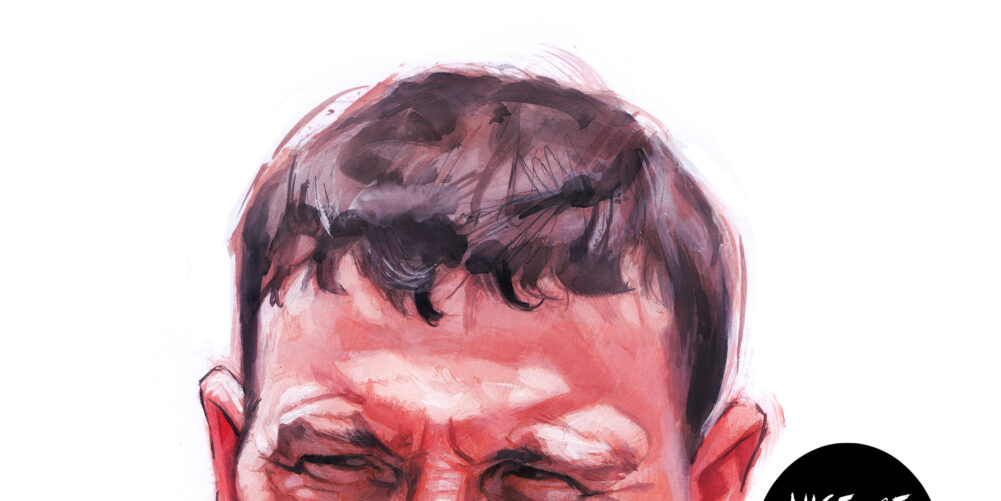If I had a fiver for every time a cricketer has said: “I never read the newspapers” I’d be a rich man. And if I had a fiver for every time he’d said: “I never read the newspapers, but that piece you wrote last week was a load of rubbish” I’d be so rich I’d be living next door to Bill Gates, or the Sultan of Brunei.
Cricketers who claim they don’t pay any attention to what’s written about them can be readily identified by a nose that has suddenly acquired Pinocchio-like dimensions. Besides which, the dressing room provides such fertile ground for wind-ups and mischief-making that someone is sure to pipe up – with a wink and a smirk to a nearby team-mate – “hey Bill, there’s an article here in the paper that’s not very complimentary about your batting.”
The very nature of the cricketer-journalist relationship can lead to some prickly moments, and I’d barely been in the job two minutes, reporting on Leicestershire for the evening paper, when I managed to upset someone. Repairing to the next door pub after play, I turned around after receiving a tap on the shoulder, which turned out to be from the Somerset player Peter Denning.
“Are you Martin Johnson?” he asked. And when I admitted I was Denning gave me a look that didn’t suggest he was about to ask whether he could buy me a pint. “You said in your article today, that I dropped an easy slip catch,” he said. “I do believe I did,” I concurred. “Well let me tell you,” he said, “that there is no such thing as an easy slip catch.” And before I could reply, off he went to sit alone in some dark corner, doubtless to brood about the injustice of it all.
There’s even more scope for friction on winter tours, given that players and journalists often find themselves in the same hotels and on the same flights. Especially as the relationship has changed dramatically down the years, with modern reportage a long way removed from how it was when EW “Jim” Swanton was the doyen of the Press corps.
It’s hard to imagine, for example, an English cricket journalist being invited to sit on an England disciplinary panel during an overseas tour, as Swanton once was, and neither would his sports desk have badgered him for quotes. And even if they had, Jim, who was not wholly without a sense of his own importance, would have informed them that the reader wanted to know what he thought, and not some trifling cricketer.
Nowadays the quote is king, so much so that the players are now coached in the art of how to speak at great length without actually saying anything. The undisputed master of this, though, was not a player, but the former coach Micky Stewart, who once said this about Michael Atherton after he was omitted from a one-day international.
“He’s not on the best of terms with himself sort of batting wise, obviously, and we wanted, on the tempo we were looking for in this particular game, for him not to force things outside his natural game. And therefore he’s not playing in this one.”
Finally, just as we were considering sending it off to Bletchley Park for deciphering, we worked out that it meant, “we’ve dropped him for slow scoring”.
Atherton was a central character in a pretty grim tour for player-Press relations, to Zimbabwe in 1996. The team was already prickly about reports from English journalists that the team was guilty of poor PR, and Atherton’s own mood was not improved by a combination of his own poor form, and the number of hacks turning up late for the start of play after a morning on the golf course.
On one particular day, Atherton was again out cheaply, and on his trudge back to the pavilion spotted a couple of English cricket writers (me and Chris Lander of the Daily Mirror as it happened) heading for the Press tent with golf clubs slung over their shoulders. At which point the captain changed direction to greet us with (and we thought we detected the merest hint of sarcasm) “nice of you to drop in.”
Winter tours in those days nearly always involved Christmas away from home, and it was traditional for the Press to put on a panto for the players on Christmas morning. So it was in Zimbabwe in 1996, except on this occasion a poll of the dressing room vote was taken on whether to attend or not, and Jack Russell was the only one who voted in favour. In those days, it was still fairly common practice for a journalist to approach a player for an interview, and it was up to the player to decide whether to give one or not. But this practice has now been replaced by commercial considerations, when players are “put up”, as the saying goes, to give turgid communal interviews which are granted only on the understanding that a sponsor will be plugged at the bottom of the article. “Joe Bloggs is official ambassador for the breakfast McMuffin” or he was “speaking on behalf of Dove Soap For Men”.
In fairness to the players, not all journalists are totally scrupulous when it comes to interpreting their words. John Emburey, during his two match spell as captain in 1988, was quizzed about dilatory West Indies over rates, and, in the days before sanctions were in place, whether a fining system might be in order. “Well, I suppose it’s something to think about,” said Embers, and he must have been as startled as anyone the following morning to pick up his paper and read: “England Skipper Blasts Caribbean Crawlers!”
No wonder Stewart, the then manager, was wary enough to answer every Press conference question with such an avalanche of waffle that no-one could ever get a controversial headline out of it. Only once was Micky ever ruffled, when, after their fourth hiding in five Ashes Tests at Trent Bridge in 1989, the Press conference began with a question from an Australian journalist who had been heavily involved with the visitors’ champagne celebrations.
He lurched forward, thrust out his tape recorder, and leaning just far enough forward to make the England manager recoil from the alcohol fumes, slurred: “tell me Micky. Why are the Poms so crap?”
This piece originally featured in The Cricket Paper, December 16 2016
Subscribe to the digital edition of The Cricket Paper here












